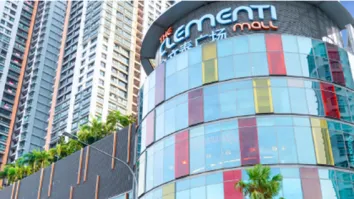
CapitaLand pushes ahead with its global drive for sustainability
The real estate group is adopting sustainability innovations through its CapitaLand Sustainability X Challenge and devising a new metric to measure its sustainability outcomes.
In an exclusive interview with Real Estate Asia, CapitaLand Group’s Chief Sustainability Officer Lynette Leong who is responsible for elevating the company's sustainability strategy and policies, discussed CapitaLand’s 2030 Sustainability Master Plan, its sustainability initiatives, and how the company is teaming up with various agencies in Singapore to drive long-term changes.
From sustainability innovations, devising a new "Return on Sustainability" metric, to the introduction of green leases at its developments, one of Asia’s largest diversified real estate groups CapitaLand is pushing ahead with its ambitious 2030 Sustainability Master Plan.
Globally, CapitaLand owns and operates a wide array of assets such as offices, retail malls, business parks, logistics, data centres, integrated developments, and lodging and residential spaces. Leong said this brings about a challenge as to how the company can fully execute its sustainability efforts across all areas.
For this, CapitaLand has crafted a Sustainability Master Plan for the next 10 years. The company is hopeful that it will elevate its sustainability efforts in the over 30 countries where they are present.
“We have a huge global footprint. Our footprint cuts across more than 230 cities in over 30 countries. And at the same time, we have a diverse portfolio of different asset classes. With this complexity in our business model and each different asset class having different specifications, it makes sustainability a lot more challenging to execute,” Leong said.
“Which is why CapitaLand’s Sustainability Master Plan is supposed to be more effective in doing that. We set ourselves ambitious goals for the next 10 years. With this complexity, it’s necessary to continually innovate and bring new ideas into the way we run operations,” she added.
CapitaLand Sustainability X Challenge
In its efforts to explore more ways to apply sustainable practices to its global portfolio across different types of assets, the group launched the CapitaLand Sustainability X Challenge to crowdsource globally from public innovators.
“This is the first time that any Singapore real estate company is crowdsourcing sustainable solutions globally for the built environment. In this challenge, we are tackling the challenges that our properties face in energy, water and waste management, as well as the improvement of the indoor air quality of our buildings in order to safeguard against health and safety issues, especially with COVID-19,” Leong said.
“One of the objectives of the CapitaLand Sustainability X Challenge is also to bring participating innovators to the next level,” she added.
Leong said finalists in the CapitaLand Sustainability X Challenge may have a chance to pilot their solutions at CapitaLand’s properties worldwide. Winners will also receive S$50,000 in funding. They may also be brought to the Smart Urban Co-Innovation Lab, in Singapore Science Park, where they will be able to collaborate with partners to enhance innovative solutions and technology.
“We have also launched a Smart Urban Co-Innovation Lab at the Singapore Science Park to catalyse development and deployment of smart city solutions. Together with the Infocomm Media Development Authority as well as the Enterprise Singapore, this private-public partnership aims to galvanise and encourage the built industry to be more innovative,” she added.
CapitaLand has received more than 270 entries from over 25 different countries in its inaugural challenge. The challenge finale is set to be held in June this year.
CapitaLand’s Green Lease Programme
According to Leong, CapitaLand’s retail lessors in its integrated development, Funan in Singapore have agreed to be part of its green lease programme. These leases guide and encourage tenants to adopt more sustainable practices, from their power consumption to the use of sustainable materials in their interior fixtures and furnishings.
“We encourage our tenants to adopt sustainable practices in the design of their spaces as well as embrace energy saving practices. This green lease is attached to our main, typical lease. The typical lease is more of a commercial lease, while a green lease helps the tenants understand what it means to occupy the space in a sustainable manner. We encourage them to use sustainable materials, either by using more recycled materials or those that are certified sustainable,” she explained.
“We also encourage them to use energy saving LED lights and if possible, to deploy motion sensors in areas that they do not use frequently. We think that sustainability need not be expensive, because there are savings that they can achieve from adopting such sustainable practices,” she added.
By incorporating sustainable efforts in their business, the tenants are also able to capture consumers who are environmentally conscious and who share the same values.
“The green lease programme is more than helping our tenants to incorporate greenery in their premises. It also helps them, if they are in the retail area, to think of new products and services that they can roll out to their own customers as consumers are also moving towards embracing sustainable practices,” Leong said.
Return on Sustainability
To track and holistically measure its profitability and long-term success alongside its sustainability efforts and sustainability key performance indicators that executives have to meet, CapitaLand is developing what they refer to as "Return on Sustainability".
“We have analysed our data from the past 12 years where we have continually reduced utilities consumption, and the cost that has been avoided is equivalent to about 11% of our operating
expenses. That's a very significant figure. This will contribute to our new metric called ‘Return on Sustainability’,” Leong shared.
“Additionally, people or companies will look at investments from just a commercial aspect. But with sustainability, we are bringing in the idea of also looking at resource efficiency, and health and safety as well, because we believe that all these and more, will contribute to the future proofing of our assets and also to mitigate early obsolescence,” she added.
Return on Sustainability also aims to capture CapitaLand’s efforts in dovetailing its sustainability efforts with its cost of funding. CapitaLand is sourcing financing for its projects through sustainable financing tools such as green loans or sustainability-linked loans, which typically come with a lower interest rate than a regular loan.
“Another area of savings that we have derived is from sustainable finance. For our sustainability-linked loans, we are able to receive interest savings from our sustainable performance. With that, these savings also contribute to our ‘Return on Sustainability’ metric,” Leong said.



















 Advertise
Advertise





